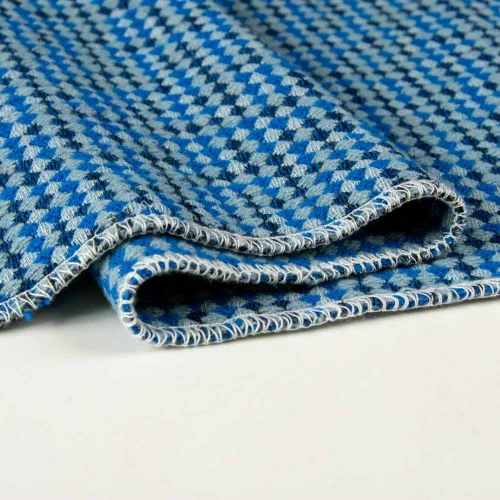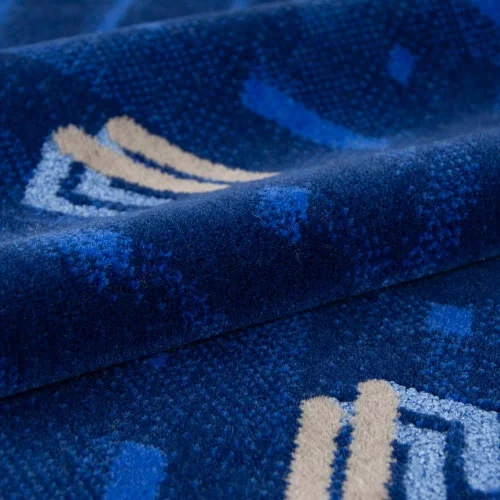Get in touch
Thank you for reaching out! Please tell us more about your needs — our expert team will get back to you within 24 hours.
Get in touch
Thank you for reaching out! Please tell us more about your needs — our expert team will get back to you within 24 hours.

Creating flame-resistant wool fabric requires going through a series of steps to guarantee that the material attains its intended characteristics.
At the start of the process, sheep undergo shearing to gather wool, which is then cleaned of impurities, like dirt and grease to prepare it for processing.
Wool cleaning and scourging includes washing the wool to eliminate any impurities in it which is important to ensure that the wool fibers are thoroughly cleaned for consistent flame resistance, in the fabric’s end product.
During the process of carding wool fibers are carefully separated and arranged to get them ready, for spinning yarn production; combing is then used to enhance this alignment by getting rid of fibers and creating a smoother texture.
Turning the fibers into yarn through spinning involves employing various methods depending on the desired thickness and strength of the yarn to ensure a consistent base, for weaving is achieved.
The methods utilized in the weaving process contribute to determining the shape and utility of the fabric produced. Various weaving patterns can impact the fabrics durability and pliability leading to a range of performance characteristics.
During this stage of the process is essential to dye the fabric to attain the desired colors while preserving its flame qualities intact.Additionally a special coating may be applied to enhance features such as water resistance and protection, from electricity or oil.

Flame-resistant wool fabric provides benefits that render it appropriate, for a range of uses.
The natural structure of wool gives it built-in fire qualities making it a popular option, for safety-focused settings.
Flame-resistant fabric that lasts a time is created by spinning natural flame-retardant fibers into yarn and then weaving and dyeing them to maintain their strength and durability.
Wools stretchiness enables it to flex without losing its form for use, in various applications.
The inherent softness of wool improves comfort levels. This makes it a great choice, for clothing that needs to be both protective and comfortable to wear.
Flame resistant wool textiles are quite simple to care for because they naturally resist stains and odors which helps in decreasing the need, for cleaning.
Flame resistant wool fabric is utilized in a variety of applications because of its characteristics.
This item’s pleasing appearance in nature along with its safety features makes it perfect for use in home decorations, like furniture upholstery and area rugs.
Flame retardant wool fabric curtains not only enhance the interior aesthetics but also add an extra layer of safety, against fire hazards.
Flame retardant wool fabric can be utilized in creating airplane seat covers to guarantee passenger safety by meeting improved fire safety requirements.
High-end garments benefit from flame-retardant wool interwoven with conductive fibers, offering both style and protection against fire hazards.

When working with wool fabrics treated to be flame retardant it is important to consider factors to ensure their effectiveness is preserved.
It’s important to use the cleaning methods to maintain the flame retardant properties without causing any damage to them over time. Stay away, from chemicals that could potentially harm these features.
Extended periods under the sun can cause the fibers to weaken over time. Hence why limiting sunlight exposure is crucial, in maintaining the color and overall structure of things.
Maintaining low humidity levels is essential to preserve the strength of fibers so it’s advisable to store these textiles in environments, for their durability.
To fully reap the advantages of flame resistant wool textiles and guarantee safety in scenarios users should grasp these essential elements.
When choosing flame wool fabric, for your needs it’s essential to consider various factors to ensure it matches your application requirements properly.
Choosing the flame retardant wool fabric depends on how you plan to use it and where you need it to perform well in terms of fire resistance levels and durability while still looking good aesthetically according to the purpose it serves.
When it comes to choosing fabric, for purposes the weight of the material plays a crucial role. Thicker fabrics tend to provide durability and protection while thinner ones are often chosen for clothing that needs to be flexible and comfortable. It’s important to match the fabric weight with the needs of its intended use.
Flame retardant wool fabric can. Feel different depending on its intended use – whether it’s for stylish home decor or high quality clothing that puts function first over looks. Incorporating flame retardant polyester with fibers into the mix not only adds a touch of style but also ensures protection, from fire risks.
Ensuring that flame retardant wool fabric retains its properties requires cleaning and maintenance.
Regularly using a vacuum cleaner is important to get rid of dust and dirt from the fabric surface keeping it clean and, in condition, and avoiding any accumulation that might impact its effectiveness.
To protect the fabric and avoid long term damage it’s essential to deal with stains before they seep in deeply. For maintaining wool quality and flame resistance its recommended to use cleaning products created for this type of fabric.
Certain strong chemicals may diminish the fire qualities of wool textiles therefore it is recommended to opt for gentle detergens or products designed for delicate fabrics to maintain their durability in the long run.
Extended periods spent under the sun can cause the fibers to weaken over time which is why reducing direct exposure to sunlight is beneficial for maintaining the color and overall structure of items such as furniture or textiles by using window coverings or keeping furniture away, from direct sunlight.

BEGOODTEX flame resistant wool textiles are known for their array of properties and characteristics.
The BEGOODTEX textiles are created to guarantee flame retardancy, for safety in different uses while maintaining their performance features intact.
These textiles can be used in ways such as in protective gear for work or in decorating homes with a wide range of possibilities, for their usefulness and versatility.
Users of BEGOODTEX have the flexibility to choose from a range of appearances to suit their style preferences and practical requirements effectively and safely without compromising on design or aesthetics.
Ensuring that flame retardant materials meet recognized standards is vital in the selection process. BEGOODTEX products adhere to criteria like BS 5852: 2006 Crib5, DIN 4102-1 B2,EN 13501-1 E, BKZ 5.3 SN 198898, NF P92-507 M2. This commitment guarantees quality and dependable performance across their range of products.
A: Wool is naturally flame-retardant. It does not ignite easily, burns with a self-extinguishing flame, and forms a soft dissipating ash residue whereas synthetic fibers form a hard, molten bead residue with melt-drip behavior.
Wool carpet testing often involves assessing how wool react to fire using ASTM tests, like ASTM D 2859 for flammability testing.